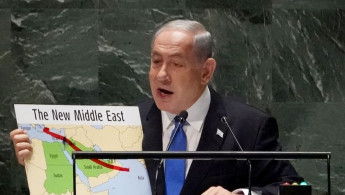Israel on 'cusp' of Saudi normalisation, Netanyahu tells UN
Prime Minister Benjamin Netanyahu told the United Nations on Friday that Israel is on the "cusp" of normalising relations with Saudi Arabia and that Palestinians should not get to "veto" the move.
Addressing the General Assembly in New York, Netanyahu said agreements in 2020 to establish formal ties with three other Arab states had already "heralded the dawn of a new age of peace", despite there having been no fighting with these countries for the deals to end.
"But I believe that we are at the cusp of an even more dramatic breakthrough – an historic peace between Israel and Saudi Arabia," he said.
"Such a peace will go a long way to ending the Arab-Israeli conflict. It will encourage other Arab states to normalise their relations with Israel."
Saudi Arabia, which has been uninvolved in any war with Israel for decades, has great influence among other Arab and Muslim states as a financial powerhouse and the home of Mecca and Medina. Normalisation with Riyadh would be a boon for Israel.
Netanyahu firmly rejected the insistence of Palestinian leader Mahmoud Abbas, in his own UN speech on Thursday, that there could be no peace in the Middle East without a Palestinian state.
"We must not give the Palestinians a veto over new peace treaties with Arab states," Netanyahu said.
"The Palestinians could greatly benefit from a broader peace. They should be part of that process. But they should not have a veto over the process."
Palestinians view normalisation with Israel as a betrayal of their national cause.
US President Joe Biden's administration has been leading talks between Israel and Saudi Arabia, whose crown prince and de facto ruler, Mohammed bin Salman, recently said that the two sides were getting closer.
Israel in 2020 established relations with the United Arab Emirates, Bahrain and Morocco, its first normalisations with the Arab world in decades after making peace with neighbouring Egypt and Jordan.
Netanyahu said that Israel and the Arab states were united by feeling a threat from the "tyrants of Tehran" – the Shia clerics who have ruled Iran since 1979.
He made a veiled threat of nuclear attack if Iran pursues its own atomic bomb. Israel has a widely known but undeclared nuclear programme.
"Above all – above all – Iran must face a credible nuclear threat. As long as I'm prime minister of Israel, I will do everything in my power to prevent Iran from getting nuclear weapons," Netanyahu said.
His office soon afterward said he had misspoken and that his prepared text said "credible military threat" instead of "credible nuclear threat."
"It was misread as credible nuclear threat. The prime minister stands by the original text of the speech," the prime minister's office said.
Tehran denies seeking a nuclear bomb but has breached limits on uranium enrichment set in a US-brokered 2015 deal following former president Donald Trump's withdrawal from the agreement and reimposition of sweeping sanctions.
Richard Gowan, who follows the United Nations for the International Crisis Group, said it was not uncommon for leaders to misread speeches.
US President Joe Biden, in a key section of his General Assembly speech on Tuesday, warned that giving in to Russia on Ukraine would abandon the principles of the United States when he meant United Nations.
"It's no secret that Israel has a nuclear deterrent of its own. But I don't think that Netanyahu was planning to advertise his nukes at the UN," Gowan said.





 Follow the Middle East's top stories in English at The New Arab on Google News
Follow the Middle East's top stories in English at The New Arab on Google News


